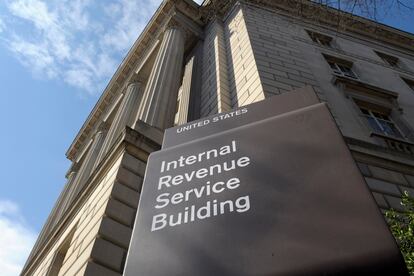The IRS says Microsoft may owe about $29 billion in back taxes, but the company disagrees
The agency says Microsoft allocated its profits among countries and jurisdictions in the years 2004 to 2013 to minimize its tax burden, a common practice known as transfer pricing

The Internal Revenue Service says Microsoft owes the U.S. Treasury $28.9 billion in back taxes, plus penalties and interest, the company revealed Wednesday in a securities filing. That figure, which Microsoft disputes, stems from a long-running IRS probe into how Microsoft allocated its profits among countries and jurisdictions in the years 2004 to 2013. Critics of that practice, known as transfer pricing, argue that companies frequently use it to minimize their tax burden by reporting lower profits in high-tax countries and higher profits in lower-tax jurisdictions.
Microsoft, which is based in Redmond, Washington, said it followed IRS rules and will appeal the decision within the agency, a process expected to take several years. The company’s shares dropped slightly in aftermarket trading.
The IRS began an audit of Microsoft in 2007 that the agency described in federal court documents last year as “one of the largest in the Service’s history.” Microsoft says it was recently notified by the IRS that the audit has ended, starting a new process to resolve a dispute over how much is owed.
Part of the long-running IRS investigation centered on how Microsoft structured a manufacturing facility starting in 2005 in the U.S. territory of Puerto Rico. The IRS has said Microsoft hired accounting firm KPMG to set up a cost-sharing arrangement with the Puerto Rican affiliate that shifted taxable revenue out of the U.S.
The IRS has also looked at other affiliates, including one that involved retail sales in Asia, according to court documents.
A blog post Wednesday from David Goff, Microsoft’s corporate vice president for worldwide tax and customs, said the company has changed its corporate structure and practices since the years covered by the audit. But he said it’s not uncommon for large multinationals to use cost-sharing arrangements, and that because Microsoft’s subsidiaries shared in the costs of developing some intellectual property, they were also entitled to related profits.
Goff also said that the $28.9 billion sought by the IRS could be reduced by up to $10 billion because of taxes paid as a result of a 2017 tax law signed by then-President Donald Trump.
Sign up for our weekly newsletter to get more English-language news coverage from EL PAÍS USA Edition
Tu suscripción se está usando en otro dispositivo
¿Quieres añadir otro usuario a tu suscripción?
Si continúas leyendo en este dispositivo, no se podrá leer en el otro.
FlechaTu suscripción se está usando en otro dispositivo y solo puedes acceder a EL PAÍS desde un dispositivo a la vez.
Si quieres compartir tu cuenta, cambia tu suscripción a la modalidad Premium, así podrás añadir otro usuario. Cada uno accederá con su propia cuenta de email, lo que os permitirá personalizar vuestra experiencia en EL PAÍS.
¿Tienes una suscripción de empresa? Accede aquí para contratar más cuentas.
En el caso de no saber quién está usando tu cuenta, te recomendamos cambiar tu contraseña aquí.
Si decides continuar compartiendo tu cuenta, este mensaje se mostrará en tu dispositivo y en el de la otra persona que está usando tu cuenta de forma indefinida, afectando a tu experiencia de lectura. Puedes consultar aquí los términos y condiciones de la suscripción digital.








































